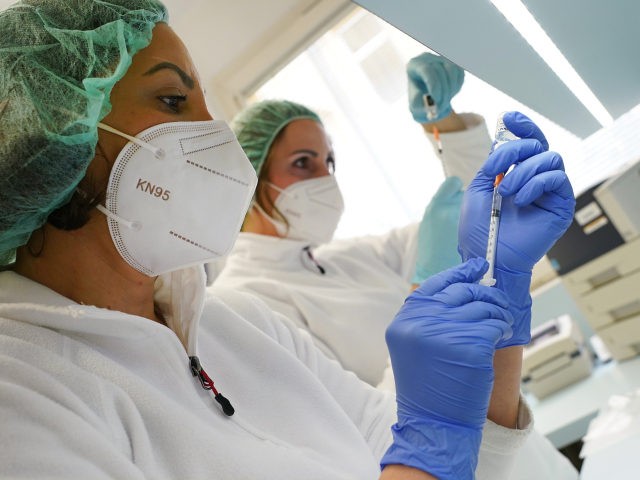Taiwan’s government announced plans on Tuesday to update its Chinese coronavirus vaccination guidelines to allow people to receive a second dose of a different brand or type of vaccine if they experience a severe allergic reaction to the first dose.
Taiwan’s Central Epidemic Command Center (CECC) currently prohibits the administration of different vaccine doses within a single inoculation, a process known as “vaccine mixing” or “vaccine cocktails.” The CECC will soon alter its guidelines to allow “vaccine mixing” for recipients of Chinese coronavirus inoculations who suffer severe allergic reactions to their first dose, CECC spokesman Chuang Jen-hsiang told Taiwan’s Central News Agency (CNA) on May 25.
Most currently available Chinese coronavirus inoculations require two separate doses spaced weeks apart. In instances in which a Chinese coronavirus vaccine recipient suffers a severe allergic reaction to his or her first dose of the shot, “it is clear that (the vaccine recipients) can’t receive their second dose using the same vaccine technology,” Chuang said.
“Allowing them to receive a different brand of vaccine for their second shot is a way to protect their right to complete the vaccination regimen,” he said.
“[F]or the time being, the exception will only apply to people who have a severe allergic reaction — not to those who experience more moderate side effects,” Chuang said, adding this “could change based on future scientific findings.”
“[Medical] experts often advise against vaccine mixing due to the lack of clinical evidence on the topic, including on how it may affect a vaccine’s safety or efficacy,” Huang Li-min, the director of the Infectious Diseases Society of Taiwan, told CNA this week.
Chuang did not reveal when Taiwan’s CECC will update its guidelines to allow “vaccine mixing” for Chinese coronavirus inoculations. CNA noted on Tuesday that the change “will not be an option until Taiwan obtains other brands of COVID-19 [Chinese coronavirus] vaccines.”
Taiwan currently offers just one brand of Chinese coronavirus vaccine through its state-run inoculation drive, the option developed jointly by the British-Swedish multinational pharmaceutical company AstraZeneca and Oxford University. The nation’s government plans to incorporate additional Chinese coronavirus vaccines into its campaign in the coming months. Taipei has said it anticipates the arrival of shipments containing the coronavirus vaccine developed by the U.S.-based pharmaceutical company Moderna in June. Taiwan has also said that a domestically-produced option should be available by July.
The AstraZeneca vaccine “is made from a weakened version of a common cold virus (known as an adenovirus) from chimpanzees. It has been modified to contain genetic material shared by the [Chinese] coronavirus — although it can’t cause the illness,” according to the BBC. “Once injected, it teaches the body’s immune system how to fight the real virus.”
The safety and effectiveness of AstraZeneca’s coronavirus vaccine have been called into question in recent months. The European Union’s health regulator (the European Medicines Agency) and British health regulators confirmed possible links between AstraZeneca’s vaccine and blood clots developed by its recipients in March. The news prompted nearly two dozen countries to pause their distribution of the vaccine in subsequent weeks, with Denmark deciding to halt its use of the vaccine entirely.
Taiwan health officials administered 311,678 doses of AstraZeneca’s coronavirus vaccine to people in the country as of May 25. CECC statistics showed that of that figure, just three cases of severe allergic reactions were recorded.

COMMENTS
Please let us know if you're having issues with commenting.